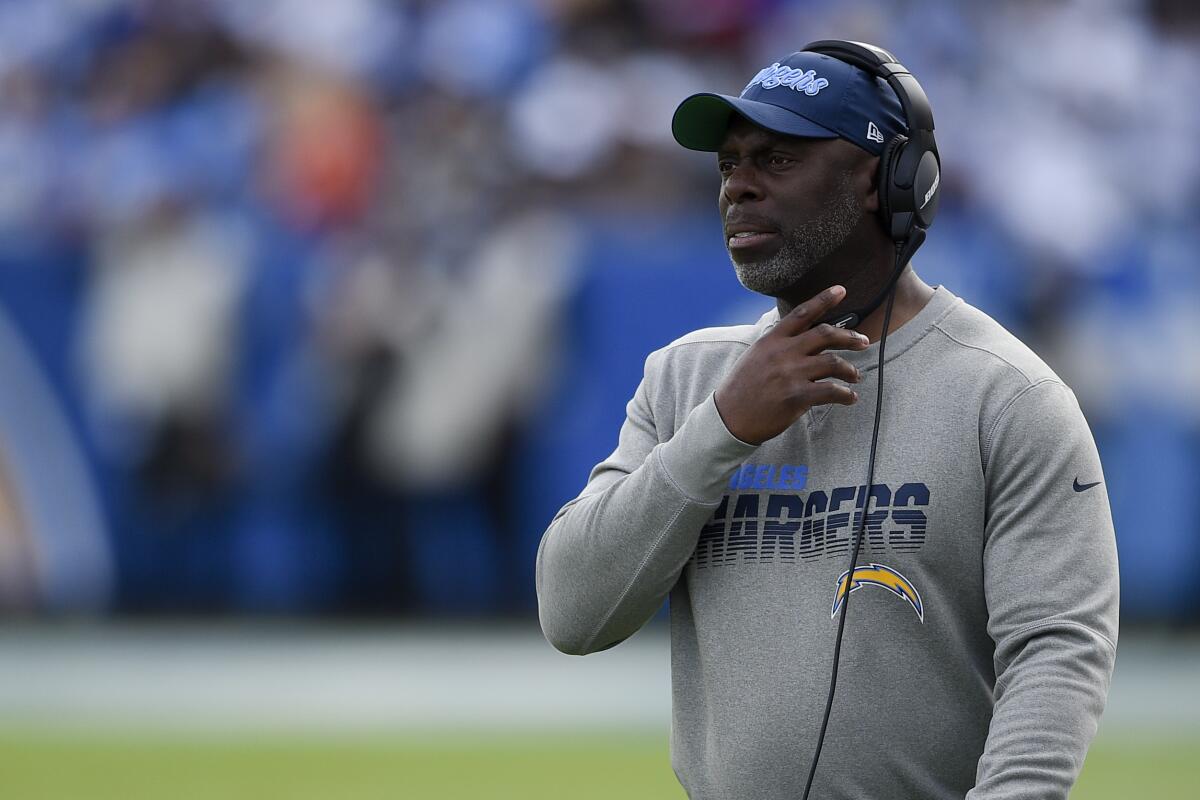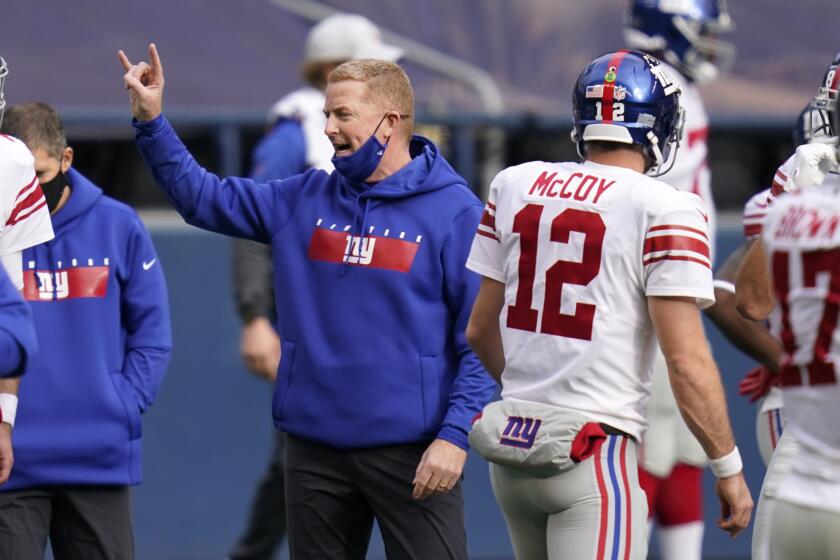NFL’s Rooney Rule still ineffective and needs enforcement

- Share via
The Christmas season might be over, but there is still one last holiday to commemorate before we can place the final bow on last year. Nestled between the firings and hirings in the NFL after the regular season ends, and the weeklong debate over who did what wrong, our annual conversation takes place over the ineffectiveness of the Rooney Rule.
Why? Because every year owners ignore the spirt of it.
Oh, they’ll bring in Black candidates and people like me will pen pieces about why a man like Anthony Lynn deserves another chance, but at the end of the day there are still only three Black head coaches, the same amount when the rule was instituted in 2003.
As the Chargers’ first Black head coach, Lynn’s time with the team was mixed. He missed the playoffs three out of his four years but overall his tenure produced better results than his predecessor. I hope the Chargers’ hiring process is more equitable than what happens in corporate America, in which a recent study found “white applicants receive 36% more call-backs than equally qualified African Americans.” It was painful watching the talented Eric Bieniemy, the offensive coordinator for Kansas City, get passed over for eight jobs last offseason while Matt LaFleur is hired to coach Aaron Rodgers despite having never called plays.
While there have been as many as eight Black head coaches in the NFL in one season, the number quickly descends the following season. While I’m not one to chalk it all up to racism, I do believe the collective lack of urgency in the matter demonstrates an offensively large indifference, which in many ways is worse. For if someone hates you, at least you know they care. There’s impact there. Indifference says your presence lacks impact. And no matter how smart a Black candidate might be, how much talent they have or the quality of the gifts they are hoping to share — this is the time of year when owners look them right in the eyes, and like the director in the classic Richard Marx song “Don’t Mean Nothin’” says, “I love your work, babe, but you’re just not what we’re looking for.”
According to the Institute for Diversity and Ethics in Sports, the NFL is currently 57.5% Black players and was as high as 69.7% in 2016. When the Rooney Rule was implemented 17 years ago it was also 69% Black, along with a third of the assistant coaches. Yet nearly two decades later ownership wants us to believe there isn’t a big enough supply of talent from that deep pool of retired Black players or assistants to climb the coaching ranks all the way up to the top job.
The Chargers began the offseason by firing coach Anthony Lynn, turning what already promised to be an active offseason into something closer to hyperactive.
Arizona’s Kliff Kingsbury holds a 35-40 record in college, had never coached in any capacity in the NFL and was hired as a head coach because that’s what Cardinals president Michael Bidwill wanted. I remember when John Elway went on his own radio show in Denver and literally said he wasn’t qualified to be the Broncos general manager because “I don’t have that kind of experience to be able to pick those players day in and day out and such.” The next month he was introduced as the Broncos GM because that’s what Broncos owner Pat Bowlen wanted.
Similarly, John Lynch walked out of a broadcast booth and right into the San Francisco 49ers GM job because that’s what 49ers CEO Jed York wanted. None of this is to suggest Bowlen or York or Bidwill are racist relics or that any of the men hired are not good at their jobs, although Elway has stepped down. No, the point is that owners do not need our approval to hire whoever they want for whatever position they want. And they certainly don’t need a rule in place to hire people of color as head coaches. All they need is the desire to do so.
The proverbial goalpost keeps moving. At first a candidate needed to pay his dues as an assistant for years, then being an offensive coordinator was said to be the definitive bar. Now it appears the narrative has shifted to the folksy charm of being a special teams coach like Marv Levy, Mike Ditka and John Harbaugh after the Giants hired Joe Judge to the chagrin of many — but the G-Men wanted him and that’s all that matters. Not that any of this matters. Former Rams assistant Zac Taylor was hired by the Bengals with a resume so thin it could double as rice paper.
In response to the uprisings that swept through the nation’s streets and the social justice conversations that transpired afterward, the league has done a tremendous amount of good with its resources and its platforms. Obviously, they weren’t leading the way, but they got here and that’s a good thing. What isn’t good is that every year around this time we’re talking about the Rooney Rule as if the league is on this arduous hunt to find qualified Black candidates when in fact it has largely been indifferent about it. It’s a cosmetic rule meant to placate.
If owners sincerely want the NFL head-coaching fraternity to proportionately reflect the game we all love, they could simply choose to hire that way. It’s not nearly as complicated as the rhetoric suggests.
So the question of this most auspicious holiday isn’t how can we fix the Rooney Rule, it’s why does a league that has “it takes all of us” imprinted on its fields still in need of oversight to include all of us?
More to Read
Go beyond the scoreboard
Get the latest on L.A.'s teams in the daily Sports Report newsletter.
You may occasionally receive promotional content from the Los Angeles Times.












